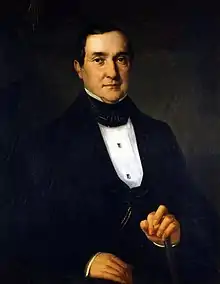Bartolomeo Merelli
Bartolomeo Merelli (19 May 1794 – 10 April 1879[1]) was an Italian impresario and librettist, best known as the manager of the La Scala Milan opera house between 1829 and 1850, and for his support for the young Giuseppe Verdi.
Bartolomeo Merelli | |
|---|---|
 Impresario Bartolomeo Merelli | |
| Born | May 19, 1794 Bergamo |
| Died | April 10, 1879 (aged 84) |
| Occupation | Impresario and librettist |
| Nationality | Italian |
| Genre | Opera |
| Notable works | Enrico di Borgogna |
Early life and theatrical agency
Merelli was born in Bergamo and studied composition there with Simon Mayr. (Gaetano Donizetti was in the same class as Merelli.) He moved to Milan around 1812 and worked there as a theatrical agent, at the same time writing a number of librettos for Mayr, Donizetti, Nicola Vaccai and other composers.[2] He set up his own agency in 1826 and managed seasons in Varese, Como and Cremona between 1830 and 1835, and was joint lessee (with Carlo Balochino) of the Theater am Kärntnertor in Vienna from 1836 to 1848.[1]
La Scala
From 1829 to 1850, Merelli managed La Scala, initially in partnership with others, who included Domenico Barbaia, and then by himself from 1835. During this period, he was responsible in 1831 for the staging of Vincenzo Bellini's Norma[2] and later for a number of works by Donizetti (e.g. Ugo, conte di Parigi, Lucrezia Borgia, Maria Stuarda and Gemma di Vergy) as well as Saverio Mercadante's Il giuramento and Il bravo.
Despite Donizetti's friendship with Merelli, the composer frequently complained about the impresario's bad judgement.[3] He was particularly incensed when he discovered in early September 1839 that Merelli, without consulting him, was mounting a production of Gianni di Parigi which, though composed between 1828 and 1832, had never appeared on stage. Donizetti sent off a strongly-worded protest on 6 September, but it was too late and the opera premiered without any input from the composer four days later.[4] Later, Donizetti turned against Merelli after unsatisfactory productions of his operas at the Kärntnertor Theatre.[2]
Meanwhile, in spring 1839, Merelli had summoned Giuseppe Verdi, who was having trouble staging his first opera, Oberto, and, after saying that he had heard favourable reports about the music (from Giuseppina Strepponi and Giorgio Ronconi), he offered to stage it in the following season on very generous terms. Verdi accepted with alacrity, the opera was a minor success, and Giovanni Ricordi bought the publishing rights for the score. Merelli himself even had a hand in it, advising Verdi to compose a scena and quartet for Act 2, scene 2.[5]
Merelli now proposed to Verdi a contract for three new operas, and Verdi accepted it. The first, Un giorno di regno, was "an unqualified disaster",[6] but the second, Nabucco, originally offered by Merelli to Otto Nicolai, was a triumph, as was I Lombardi in 1843. Giovanna d'Arco (1845) was the last of Verdi's operas to be mounted by Merelli, but, although it was a success, there were problems during rehearsals with inadequate scenery and costumes and an orchestra that was too small. The press was lukewarm, and Merelli was negotiating with Ricordi about the sale of the full score behind Verdi's back. The composer swore that he would never again speak to Merelli or his staff, nor would he ever set foot again on the stage of la Scala.[3]
Later life
When the 1848 revolution broke out, Merelli was suspected of spying for Radetsky, and he spent some time in Vienna after leaving La Scala. In 1861 he returned to Milan and again took charge of the opera house, but in 1863, after losing much of his money, he retired to the Bergamo area. Despite his generosity, his sharp artistic and financial practices led many people to distrust him. He died in Milan. His son, Eugenio (1825–1882) organised tours to European cities such as Edinburgh, Venice, Vienna, Paris, Moscow (according to Tchaikovsky's articles from the early 1870s) and probably St Petersburg.[1][2]
Libretti by Merelli
| Year | Title | Composer | Genre |
| 1816 | L'idolo Birmanno | Paolo Brambilla | |
| 1818 | Lanassa (with Gaetano Rossi) | Simon Mayr | melodramma eroico |
| 1818 | Alfredo il grande | Simon Mayr | melodramma serio |
| 1818 | Enrico di Borgogna | Gaetano Donizetti | opera semiseria |
| 1818 | Una follia | Gaetano Donizetti | farsa |
| 1818 | Il lupo d'Ostenda | Nicola Vaccai | opera semiseria |
| 1820-21 | Le nozze in villa | Gaetano Donizetti | opera buffa |
| 1822 | Zoraida di Granata | Gaetano Donizetti | opera seria |
| 1824 | Pietro il grande, ossia Un geloso alla tortura | Nicola Vaccai | opera buffa |
| 1824 | La pastorella feudataria | Nicola Vaccai | opera semiseria |
| 1826 | Il precipizio, ossia Le fucine di Norvegia | Nicola Vaccai | melodramma semiseria |
| 1829 | Don Desiderio ovvero Il disperato per ecceso di buon cuore | Francesco Morlacchi | opera buffa |
| 1851 | Emma, ossia Il protettore invisible | Julius Benoni (1832–62?) |
References
Notes
- Warrack & West 1997, p. 463.
- Rosselli 1992, pp. 340–341.
- Budden, p. 206.
- Commons 2011, pp. 50–51.
- Budden 1973, pp. 47 and 60.
- Budden 1973, p. 71.
Sources
- Budden, Julian (1973). The Operas of Verdi, Volume 1. London: Cassell. ISBN 0-304-93756-8.
- Commons, Jeremy, "Wit Outwitted", in programme book for Wexford Festival Opera, 60th Anniversary Season, 21 October – 5 November 2011
- Rosselli, John (1992). The New Grove Dictionary of Opera, edited by Stanley Sadie, vol.3, article "Merelli, Bartolomeo". Oxford: Oxford University Press. ISBN 978-0-19-522186-2.
- Warrack, John; Ewan West (1997). The Oxford Dictionary of Opera. Oxford: Oxford University Press. ISBN 0-19-869164-5.